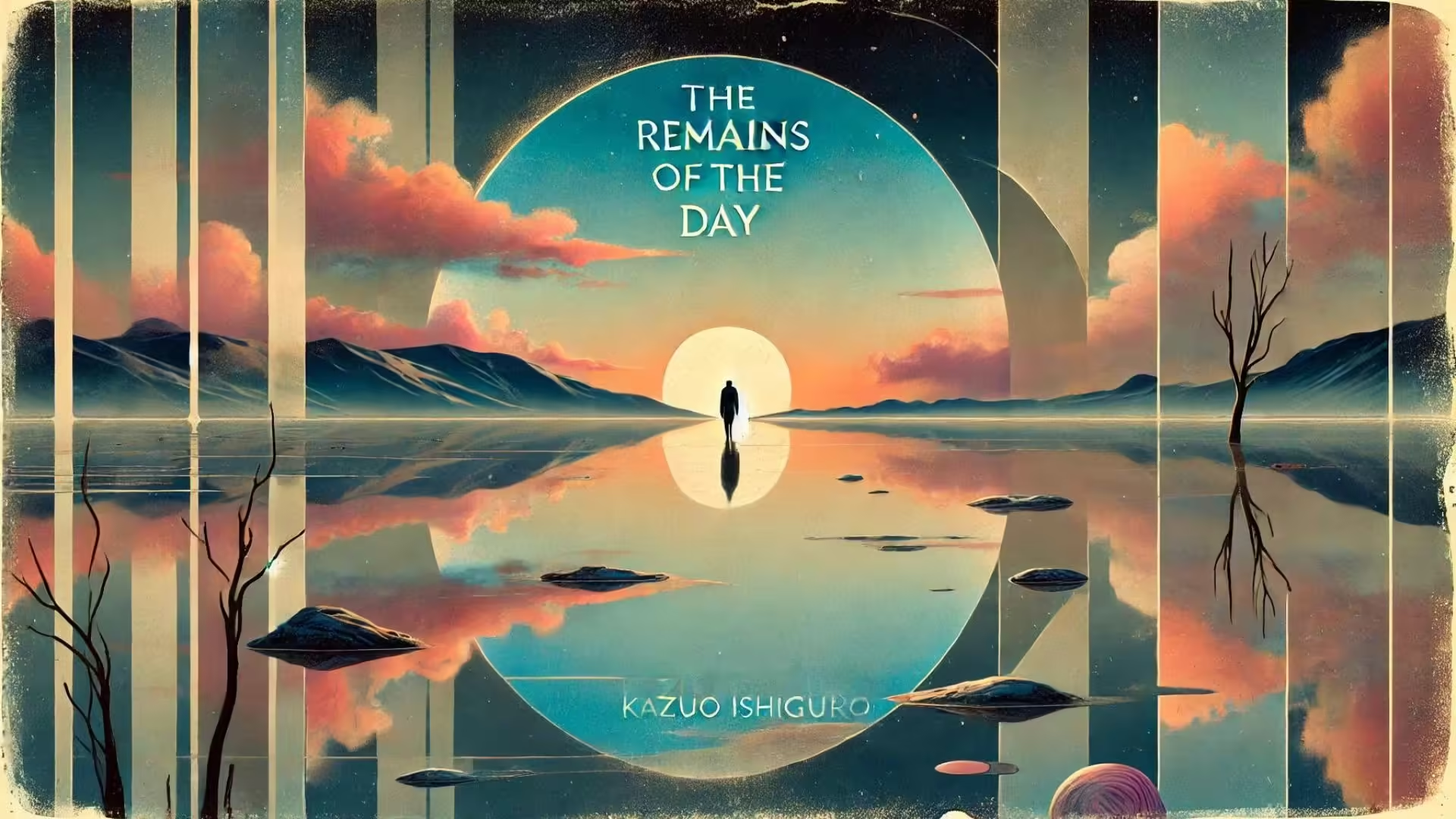Kazuo Ishiguro is best known for his novels, but his literary prowess extends beyond prose. “The Remains of the Day,” a poem attributed to the same title as his famous novel, encapsulates the themes that Ishiguro masterfully explores in his work: memory, regret, and the relentless passage of time. This poem, like much of Ishiguro’s writing, invites readers to contemplate the choices they’ve made and the lives they’ve lived, offering a profound reflection on what it means to look back on one’s life.
The Theme of Memory: A Double-Edged Sword
Memory, both as a blessing and a curse, lies at the heart of “The Remains of the Day.” The poem paints a picture of a life lived in the shadow of past decisions. Memory serves as a reminder of the moments that shaped us, yet it also haunts us with the knowledge of what might have been. Ishiguro deftly captures this duality, allowing readers to experience the weight of nostalgia and the pain of regret simultaneously.
In everyday life, memory is often a source of comfort. We cherish the good times, holding onto them as a refuge from present challenges. Yet, memory can also trap us, keeping us tethered to past mistakes and missed opportunities. Ishiguro’s poem forces us to confront this reality—reminding us that the past is inescapable, but our relationship with it is what ultimately defines our present.
Regret: The Unseen Burden
Regret is a recurring motif in “The Remains of the Day.” Through his eloquent verses, Ishiguro illustrates how regret can subtly, yet powerfully, shape a person’s identity. The poem reflects on the paths not taken, the words left unsaid, and the relationships that could have been different. It’s a haunting reminder that the choices we make—or fail to make—can leave a lasting imprint on our souls.
Regret, as Ishiguro presents it, is not always loud and dramatic. It often lingers in the quiet moments of reflection, surfacing when least expected. The poem invites readers to consider their own regrets, urging them to acknowledge these feelings rather than suppress them. In doing so, it opens the door to a deeper understanding of oneself and the human experience.
Time: The Relentless Force
Time is another key theme in “The Remains of the Day.” The poem emphasizes the inevitability of time’s passage, portraying it as a force that shapes and reshapes our lives without pause. The metaphor of the “remains of the day” suggests that what is left behind—memories, regrets, missed opportunities—is all that we can hold onto as time moves forward.
In many ways, the poem serves as a meditation on the passage of time. It prompts readers to consider how they spend their days and how those choices accumulate over the course of a lifetime. The poem asks a simple yet profound question: What will be left when the day is done? This contemplation of time and its effects encourages readers to live with intention, knowing that every moment counts.
The Impact of “The Remains of the Day”
While “The Remains of the Day” is often overshadowed by Ishiguro’s novel of the same name, the poem stands as a powerful work in its own right. Its themes of memory, regret, and time resonate deeply with readers, offering a mirror to reflect on their own lives. Ishiguro’s ability to distill complex emotions into simple yet evocative language makes the poem both accessible and profoundly moving.
The poem’s influence extends beyond literature, as its themes are universal and timeless. Whether in personal reflection, artistic inspiration, or philosophical inquiry, “The Remains of the Day” continues to provoke thought and spark conversation. It encourages readers to examine their lives with honesty and introspection, making it a work that lingers in the mind long after the final verse is read.
A Poem That Echoes Through Time
Kazuo Ishiguro’s “The Remains of the Day” is more than just a poem—it’s a journey into the depths of the human soul. Through its exploration of memory, regret, and time, it challenges readers to confront their own lives and the choices that define them. As we move through our days, the poem serves as a reminder to live fully, embrace our memories, and make peace with our regrets. In the end, what remains is the essence of who we are, shaped by the passage of time and the echoes of our past.
Expand Your Vocabulary
- Memory: The mental capacity to store, recall, and reflect on past experiences. In the context of the poem, memory serves as both a comfort and a burden. In everyday life, you might say, “My fondest memory of childhood is playing in the park with my friends.”
- Regret: A feeling of sadness or disappointment over something that has happened or been done, often accompanied by a wish that it could have been different. In the poem, regret shapes the speaker’s reflections on life. In everyday conversation, you might use it like, “I regret not taking that job opportunity when I had the chance.”
- Reflection: Serious thought or consideration, often involving looking back on past events. The poem invites readers to reflect on their own lives. You might say, “After a lot of reflection, I decided to change careers.”
- Nostalgia: A sentimental longing or affection for the past, typically for a period or place with happy personal associations. In the poem, nostalgia is intertwined with memory and regret. In daily use, you might say, “Listening to that song fills me with nostalgia for my high school days.”
- Inevitable: Certain to happen; unavoidable. The passage of time in the poem is described as inevitable. You might use this word to discuss something that cannot be prevented, like, “Aging is inevitable, so it’s important to live life to the fullest.”
- Meditation: A practice of focused reflection, often used to achieve a sense of calm or understanding. The poem can be seen as a meditation on time and life. In everyday language, you might say, “I find that meditation helps me clear my mind and focus on what’s important.”
- Haunting: Continually recurring to the mind; not easily forgotten. The themes of memory and regret in the poem are described as haunting. You might say, “The haunting melody of the song stayed with me long after it ended.”
- Remains: What is left after other parts have been removed, used, or destroyed. In the poem, “remains” refers to what is left of a life after time has passed. In everyday language, you might say, “After the fire, only the remains of the house were left.”
- Introspection: The examination of one’s own thoughts and feelings. The poem encourages introspection, prompting readers to look inward. You might say, “I spent the weekend in introspection, trying to understand why I felt so anxious.”
- Universal: Applicable to all people or situations; common to everyone. The themes of the poem are described as universal because they resonate with a wide audience. In daily conversation, you might say, “The desire for love and acceptance is universal.”
Let’s Talk
- The poem “The Remains of the Day” delves into the theme of memory as both a comfort and a burden. How do your memories influence your present decisions and outlook on life?
- Regret is a powerful emotion explored in the poem. Have you ever experienced regret that shaped your future actions? How did you overcome it?
- The inevitability of time is a key theme in the poem. How do you deal with the passage of time, and how do you make the most of each day knowing that time moves forward relentlessly?
- Nostalgia often brings both joy and sorrow. How do you balance appreciating the past with living in the present?
- The poem encourages introspection. How often do you take time to reflect on your life and choices? What benefits do you find in doing so?
- The concept of ‘remains’ in the poem suggests that what we leave behind is what defines us. What do you hope will remain of you after significant moments or even at the end of your life?
- How do you interpret the idea that time is a relentless force in your own life? Do you see it as something to be feared, respected, or embraced?
- The haunting nature of memory and regret in the poem can resonate with many people. How do you cope with thoughts or memories that seem to linger and affect your mood or perspective?
- The universal themes of the poem—memory, regret, and time—are relatable to almost everyone. How do you think these themes connect people across different cultures and experiences?
- Given the poem’s reflection on past decisions, what advice would you give to someone struggling with regrets or the fear of making the wrong choices?










0 Comments